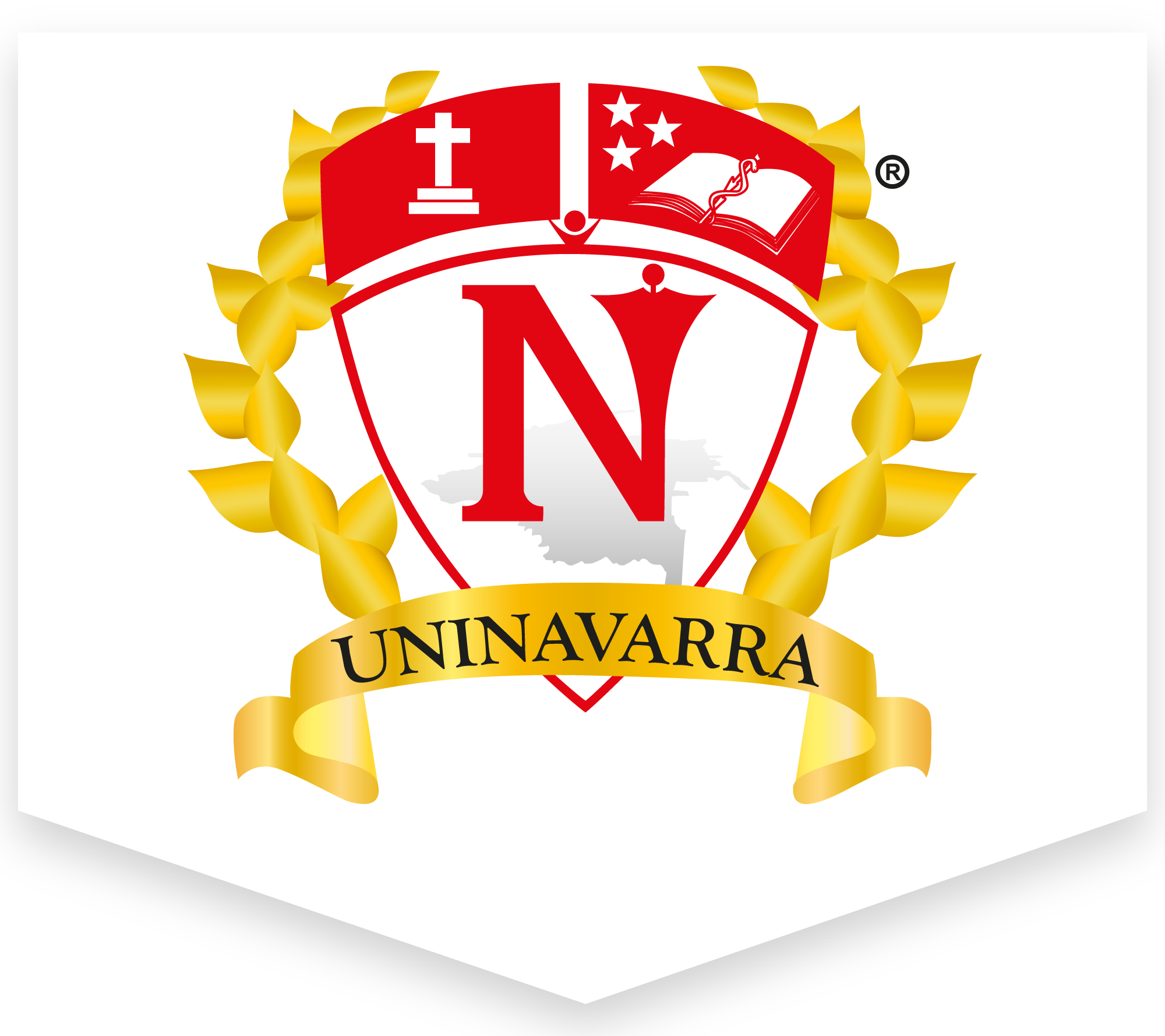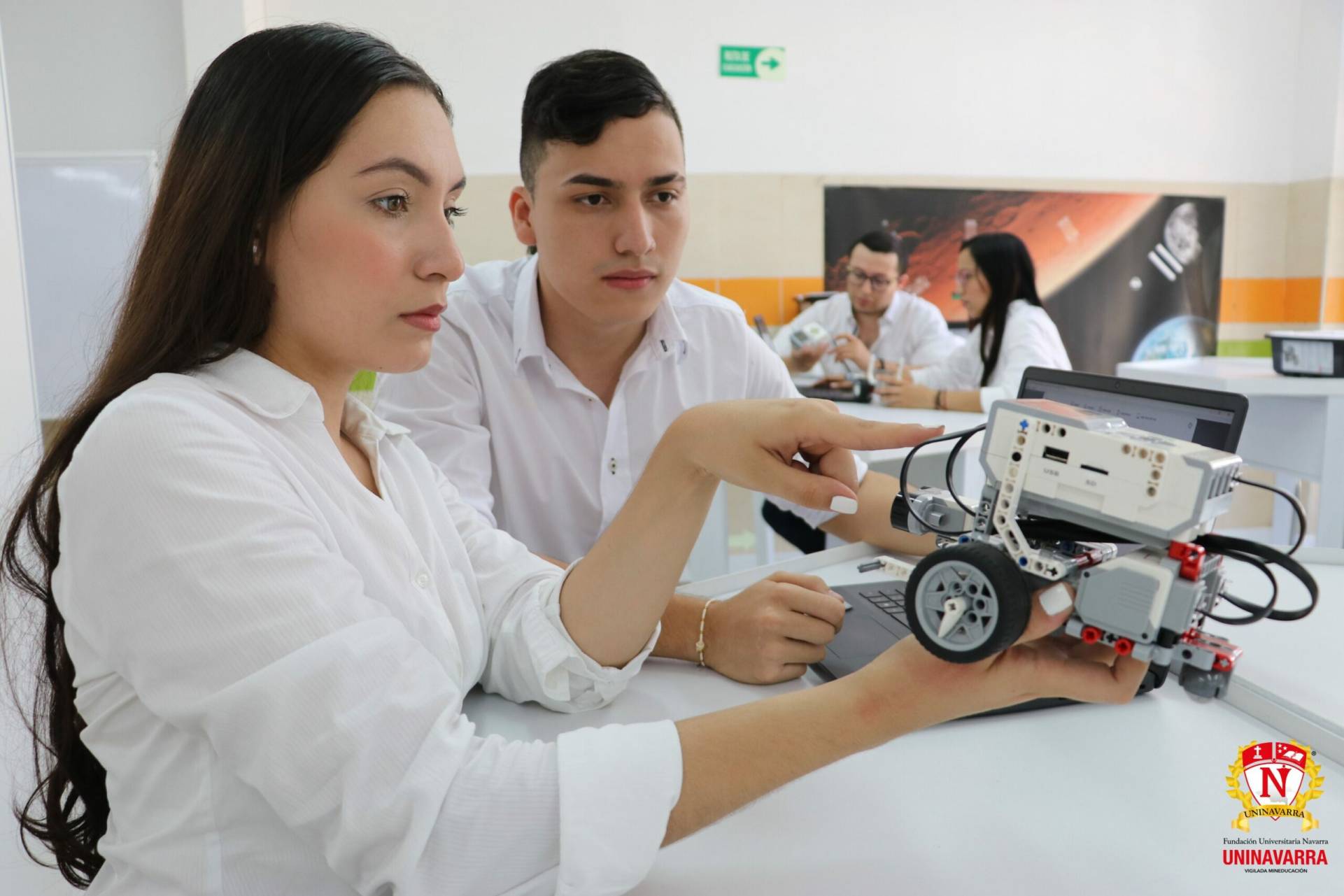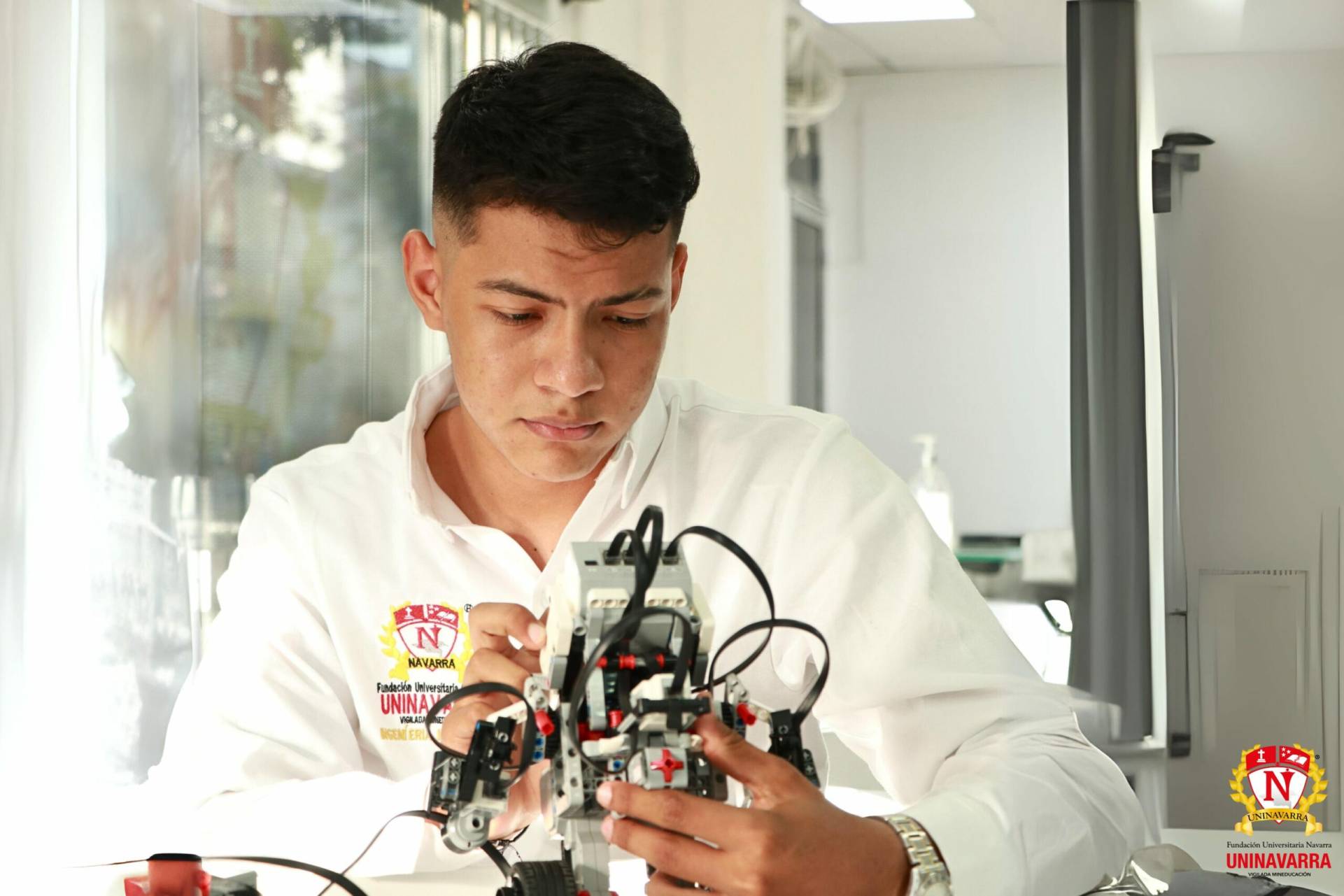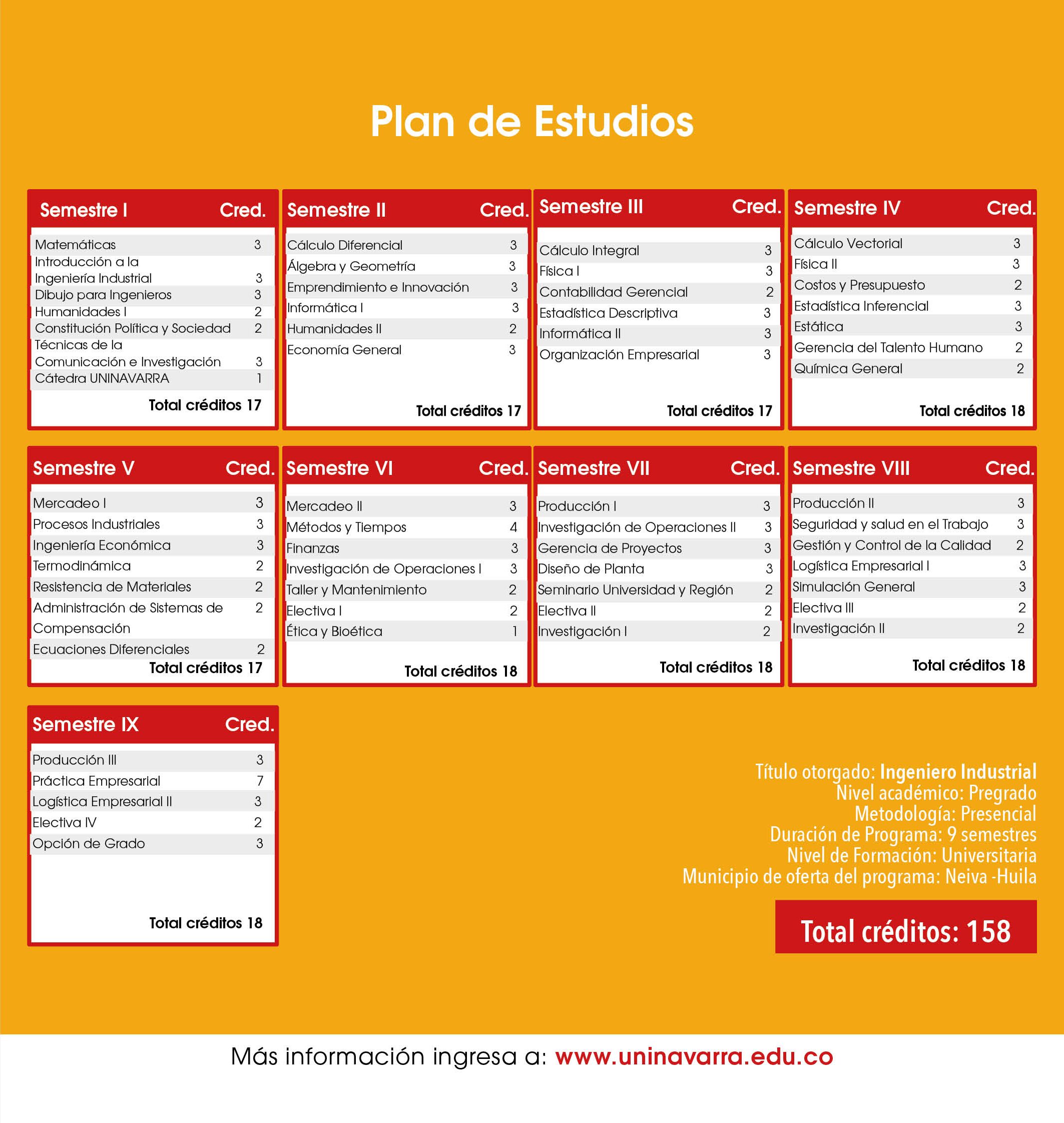| Title awarded: Industrial Engineer |
| SNIES Code 103239 |
| Qualified Registration: Resolution no. 001278 of February 15, 2024 |
| Duration of the Program: 9 semesters |
| Number of academic credits: 158 |
| The program is attached: Faculty of Engineering, Architecture and Urban Planning |
| Academic Level: Undergraduate |
| Level of training: Professional |
| Methodology: On-site |
| Location: Neiva, Huila, Colombia |
| Periodicity of admission: Semiannual |
| Contacts: +57 317 514 1730 - 608 8740089 - 608 8722049 - 608 871119 |
Engineering Research Group
About the Center for Entrepreneurship and Sustainability
Presentation of the program
The Industrial Engineering program of the NAVARRA UNIVERSITY FOUNDATION -UNINAVARRA- is structured on the basis of two training components: basic (semesters I, II, III, IV and V) and professionalization (semesters VI, VII, VIII, IX and X), and five areas: basic sciences, basic engineering sciences, applied engineering, humanities and social sciences, and the complementary area; with 54 subjects and 163 academic credits, structure based on the training demands of the industrial engineer.
This program proposes a training that aims to develop skills and abilities in students in the management of productivity and business logistics. Therefore, it proposes a curriculum that contributes to this training and differentiates it from other curricula.
The curriculum, therefore, explicitly provides more training in the areas of productivity and logistics. To this end, it offers three production courses and two business logistics courses during the professionalization component, in semesters VII to IX. Similarly, the topic of productivity appears as a transversal element in all the other subjects of the professional component.
The curricular structure proposed for the program also makes it distinctive with respect to others offered in the region, in the way it builds meaning from the needs detected in the environment, translated into research questions that allow establishing a dialogue between subjects and promote teaching and learning processes for both students and teachers, allowing interdisciplinary views of the objects of study, which allow students to play a leading role in the process of knowledge construction, develop strategies for autonomous work and result in the construction of a research culture.
To provide society with integrally trained engineers, committed to the industrial development of the region and the country, for the growth and prosperity of their environment.
UNINAVARRA's Industrial Engineering program will be positioned professionally by the academic and human quality of its graduates, who will permanently demonstrate their capacity for work and leadership.
Thus, the conditions of the Industrial Engineering Program of the Navarra University Foundation - UNINAVARRA are consistent with the institutional typology, identity, mission and vision; it is also consistent with the modality of its offerings.
Admission requirements
Admission to UNINAVARRA is free and voluntary, through enrollment processes of applicants according to their vocation. Admission to UNINAVARRA is based on three profiles:
- Personal profile: personality traits of the applicants are evaluated to verify affinity with the entrance profile of each program.
- Intellectual profile: the degree of knowledge is evaluated, and based on the Aptitude and Knowledge State Tests of the Colombian Institute for the Promotion of Higher Education (ICFES), minimum admission scores will be established for each program.
- Attitudinal profile: determined in interview processes in which the Program Director will determine the affinity between the student and the formative requirements of the program.
Applicant Profile
The applicant to the Industrial Engineering program at Fundación Universitaria Navarra - UNINAVARRA will have communicative skills to express the knowledge acquired in their academic training, and will have clarity in their professional choice, as well as ethical bases that express their commitment to the community, the family and the State.
Graduate profile
The Industrial Engineering graduate has a comprehensive training and knowledge to make diagnoses of the environment that allow him/her to provide solutions based on Industrial Engineering, design and implement logistic chains, organize the production of a company of goods or services, design and implement solutions to improve productivity in production processes of goods and services, design and implement solutions to marketing problems of any type of company, create companies, and apply the administrative process in other fields of knowledge.
The graduate of the Industrial Engineering program, at the end of the training process, will be able to:
- Design and implement solutions to production problems of goods or services, based on methods and techniques of flexible production systems, to increase productivity.
- To formulate research projects aimed at optimizing production systems and resources used to improve competitiveness.
- Integrate quality systems techniques, tools and knowledge into process design, according to the organizational context, to evaluate and monitor process performance.
- To guide and apply the knowledge of engineering, socio-humanistic sciences and basic sciences, integrating them for the design, planning, management, optimization and control of production systems of goods and services involving human resources, processes, financial, technical, time, information and material resources, in order to contribute as an agent of productivity improvement, which is the fundamental objective of the company.
- Contribute to the socioeconomic development of the region and the country, actively participating in the solution of problems within the organizations, seeking to make them highly competitive.
- Perform management and control activities in areas of the company such as Production, Quality, Administration, Human Resources, Logistics and Research and Development.
Professional profile
The professional of the Industrial Engineering program is the person who, after finishing his or her degree, can work in the field of operations management, supply chain management, project formulation, evaluation and administration, marketing management, and administrative and financial management in any type of company.
According to the curriculum, the Industrial Engineering graduate will be able to:
- To become entrepreneurs by creating their own technology-based company.
- Assume operational and managerial positions in engineering areas of companies.
- Participate in data analytics teams in public and private entities.
- Assume positions in logistics areas in industries of multiple sectors.
- Work as an analyst for decision support in public and private entities.
- Participate in engineering projects in various fields.
- To act as advisor and/or consultant in procedures involving his line of action in projects and undertakings.
In addition, he/she will be able to work as:
- Production Manager.
- Logistics Manager.
- Quality Manager.
- General Manager.
- Cost Director.
- Purchasing Manager.
- Entrepreneur of his own company.
- Professional in charge of production planning and start-up in manufacturing companies.
- Manager, coordinator or director of Quality in companies of different productive sectors of the country.
- Human Resources manager, coordinator or director.
- Operations coordinator or director in service sector companies.
- Coordinator or logistics manager in companies of the transportation sector.
- Manager, coordinator or director of investment and research projects.
Based on these approaches and in accordance with the demands and requirements of the State, the Navarra University Foundation - UNINAVARRA orients the Industrial Engineering program towards the development of competencies that define the professional profile of the graduate for the realization of their life project and their field of action. The professional has the ability to respond to specific labor needs, guaranteeing real present and future opportunities for work performance, by contributing to the solution of needs and problems of socioeconomic and cultural development. In addition, it has a proven technical, technological and scientific actuality in its contents, and is in line with the philosophy of the Institution, where the subjects that make up the curriculum are relevant, appropriate and contribute to the formation of the professional profile of the academic program.
This makes it evident that there is a direct relationship between the professional, graduation and occupational profile and the name of the program, which has not been modified, but is maintained precisely because it is relevant in the current scenario of education and industry.
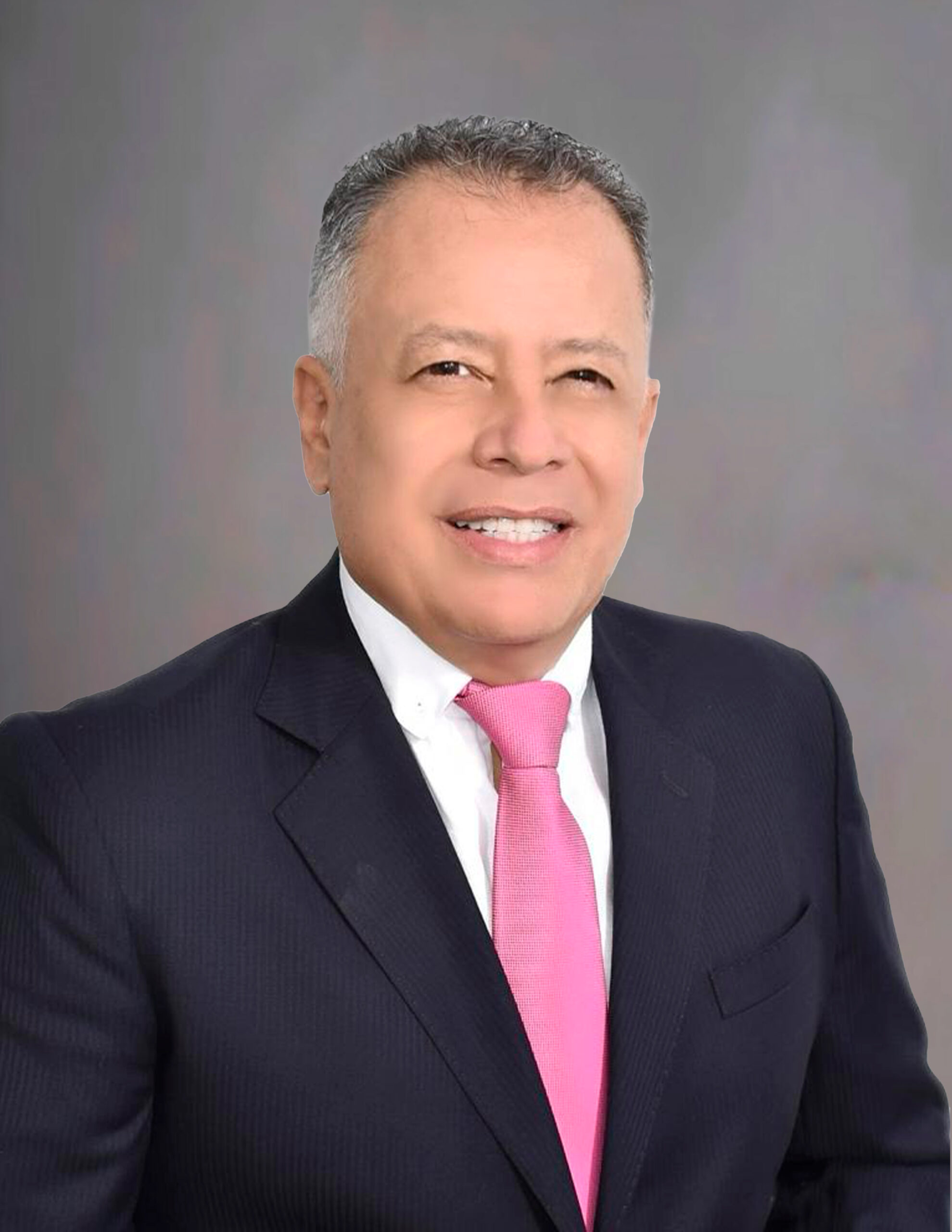
William Eduardo Navarro Parra
Dean of Engineering, Architecture and Urbanism
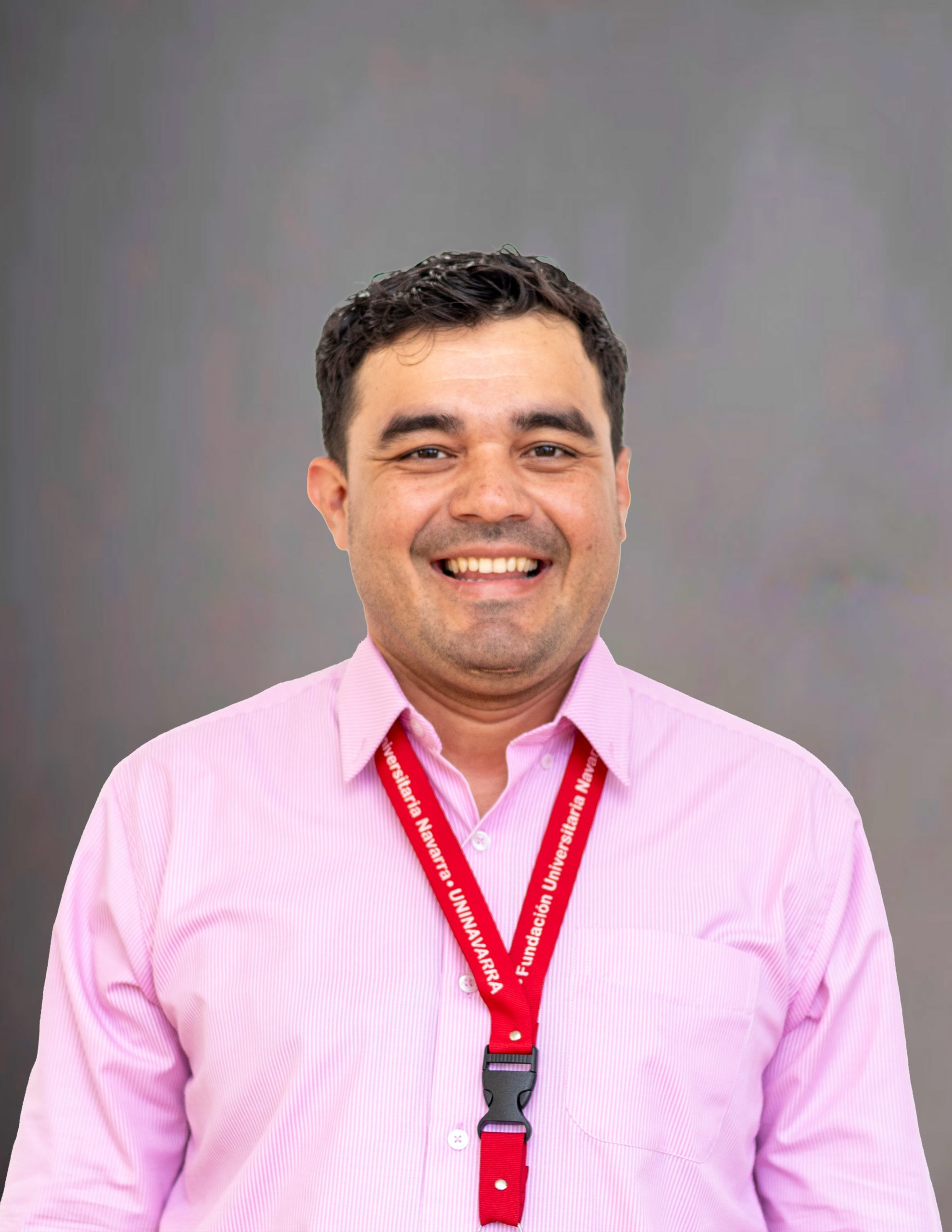
Sergio Andres Castañeda Mendez
Program Director
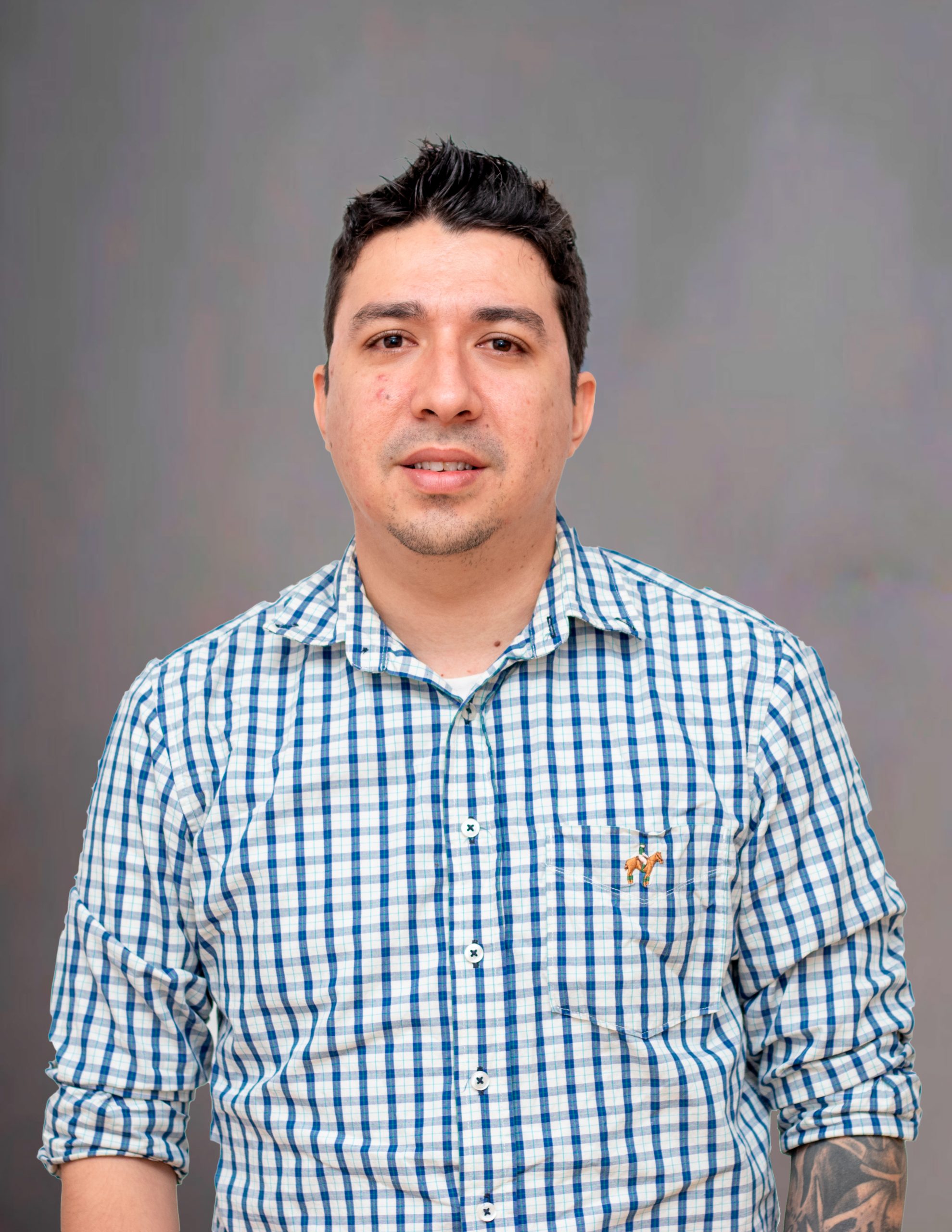
Daniel Enrique Ovalle Cerquera
Professor

Juan David Parra Quintero
Professor

José Adel Barrera Cardozo
Professor

Jhon Sebastián Perdomo González
Professor
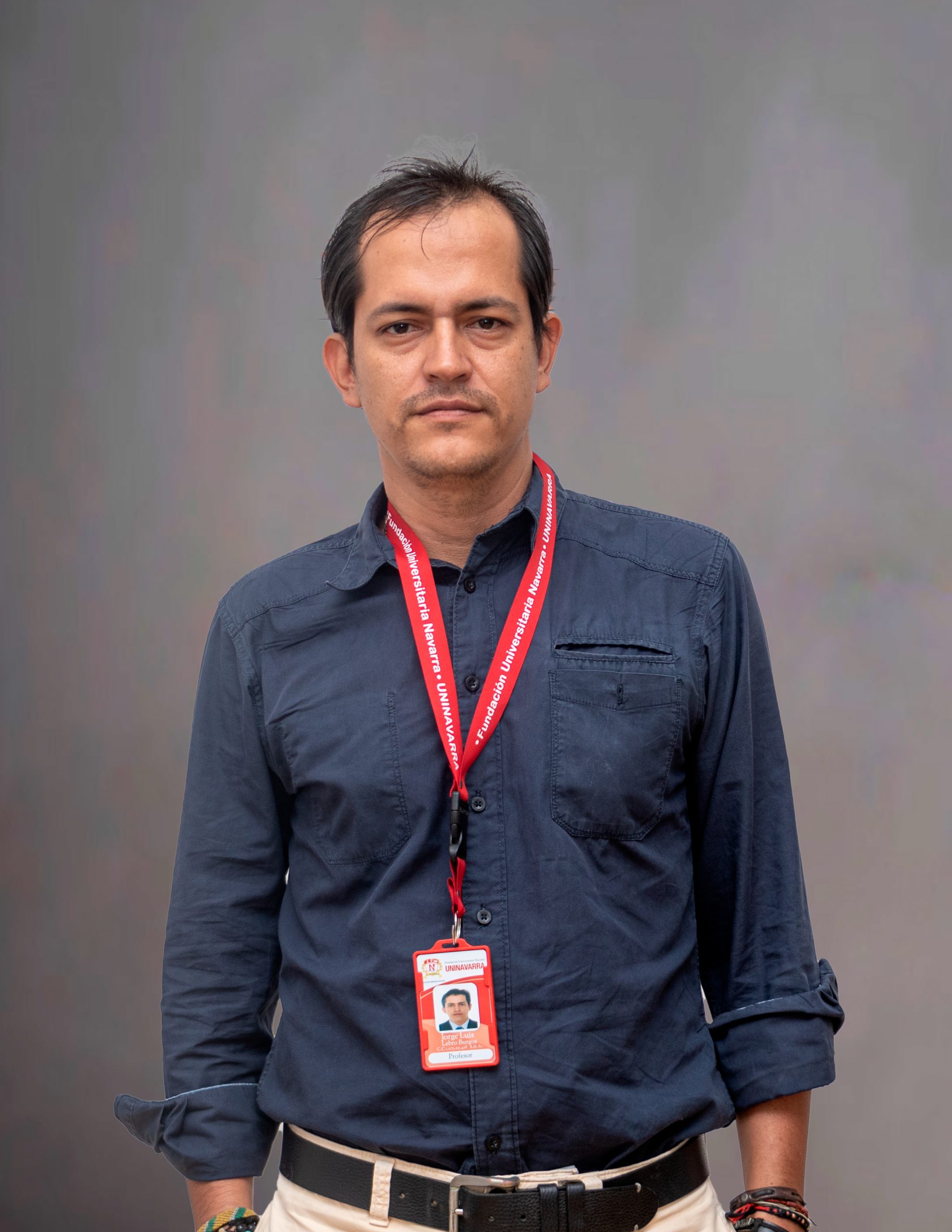
Jorge Luis Lebro Burgos
Laboratory Coordinator
🌟🔬 Outstanding Results of the II International Meeting of Research Seedbeds - Opening Frontiers 🔬🌟
The II International Meeting of Research Seedbeds - Opening Frontiers was a resounding success, consolidating itself as a space for academic exchange, innovation and scientific projection. 
 Key results of the event :
Key results of the event :
 8 papers and projects presented by students and researchers from different national and international institutions.
8 papers and projects presented by students and researchers from different national and international institutions.
 Participation of 5 countries, promoting cultural and academic exchange in various areas of knowledge.
Participation of 5 countries, promoting cultural and academic exchange in various areas of knowledge.
 Recognition of the 8 projects that stand out for their impact on innovation, sustainability and social development.
Recognition of the 8 projects that stand out for their impact on innovation, sustainability and social development.
 Keynote lectures that inspired new lines of research and international collaboration.
Keynote lectures that inspired new lines of research and international collaboration.
 Thanks to all the participants, institutions and organizers who made this event possible. Your enthusiasm and commitment are proof of the power of research to open new frontiers of knowledge.
Thanks to all the participants, institutions and organizers who made this event possible. Your enthusiasm and commitment are proof of the power of research to open new frontiers of knowledge. 
 Let's continue working together to strengthen science and innovation!
Let's continue working together to strengthen science and innovation!
📊 Impact and Outcomes of Industrial Engineering Entrepreneurial Internships ⚙️
The Industrial Engineering program continues to consolidate its position as a bridge between academia and industry, thanks to the outstanding results obtained during the Business Internships carried out this semester.
 Outstanding results :
Outstanding results :
 3 projects developed in key areas such as process optimization, continuous improvement, and HSEQ.
3 projects developed in key areas such as process optimization, continuous improvement, and HSEQ.
 Active participation of our students in 3 national companies, applying theoretical knowledge in real environments.
Active participation of our students in 3 national companies, applying theoretical knowledge in real environments.
 We thank our partner companies for trusting in the talent and commitment of our students, as well as the professors who accompanied them in this training process. This success is the result.
We thank our partner companies for trusting in the talent and commitment of our students, as well as the professors who accompanied them in this training process. This success is the result.
🌟🌍 Total Success at the International Congresses 2024 🌍🌟
On November 14 and 15, our institution hosted an academic event of international stature: the II International Congress on Innovation and Business Development, the II International Congress on Engineering and Industrial Transformation and the II International Congress on Research and Innovation in Environmental Sustainability.
 Outstanding results :
Outstanding results :
 More of 8 international trend-setting presentations on innovation, engineering and sustainability.
More of 8 international trend-setting presentations on innovation, engineering and sustainability.
 Participation of experts and academics from Mexico, Chile, Peru The participants shared their progress and proposals to face the global challenges.
Participation of experts and academics from Mexico, Chile, Peru The participants shared their progress and proposals to face the global challenges.
 600 registered attendees, including students, professors and professionals, who enriched the debates and practical workshops.
600 registered attendees, including students, professors and professionals, who enriched the debates and practical workshops.
 Innovative projects presented by students, strengthening the link between academia and the business sector.
Innovative projects presented by students, strengthening the link between academia and the business sector.
 We thank all attendees, speakers and organizers for making possible this event that promotes the exchange of knowledge, empowerment.
We thank all attendees, speakers and organizers for making possible this event that promotes the exchange of knowledge, empowerment.
Related Programs
